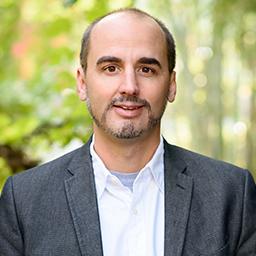Based on that research, new drug combinations aim to intercept cancer development

Credit: City of Hope
DUARTE, Calif. — In order for cancer to form in the human body, normal cells must acquire multiple mutations before they develop toward the disease. It was previously believed that these mutations acted in concert in the progression of cancer. But a new Nature study led by City of Hope’s Markus Müschen, M.D., Ph.D., chair of the Department of Systems Biology and The Norman and Sadie Lee Foundation Professor in Pediatrics, uncovered a new aspect of this theory.
In a paper published today, Müschen and an international team of researchers outline their findings that individual mutations only promote progression toward leukemia if they converge on one single pathway. In addition, some mutations actually generate “noise” that drown out central elements of cancer development.
“Surprisingly, mutations that are not aligned with the central cancer pathway but instead promote growth and survival in divergent directions are counterproductive and even prevent overt transformation into cancer,” said Müschen, who is the corresponding author of the new study. “The concept of multistep cancer progression suggested that acquisition of additional mutations would invariably promote cancer, but we found that many of these mutations, in fact, lead to a dead end and stop cancer progression rather than promoting it.”
The team reached this conclusion after analyzing 1,148 patient-derived B cell leukemia samples to see how mutations either cooperated or antagonized each other. Current targeted therapies in cancer are based mainly on suppressing the principal driver of cancer, but the study’s findings offer a previously unrecognized strategy to enhance treatment responses.
As a strategy for preventing drug resistance and relapse, Müschen and his colleagues explored an alternative approach based on reactivating suppressed pathways in order to interfere with the principal oncogenic driver and potentially amplify treatment responses.
“We have developed drug combinations that would mimic these effects,” Müschen said. “Like a mutation that activates a divergent pathway, we found drugs to reactivate pathways that diverge from the central oncogenic driver to disrupt oncogenic signal transduction in these cells.”
Müschen and his team are now testing various drug combinations.
“In these combinations, one drug directly inhibits the central oncogenic driver, while the second drug reactivates divergent pathways that were silenced during the transformation process,” Müschen said. “If successful for leukemia, we may be able to test this approach for the treatment of other cancers.”
###
The study, titled “Signalling input from divergent pathways subverts B-cell transformation,” features additional City of Hope authors and researchers from the Dana Farber Cancer Institute and Harvard Medical School, University of California San Francisco, University of Cambridge, University of Pittsburgh Drug Discovery Institute, University of Eastern Finland and Tampere University Hospital in Finland. Portions of the work were supported by a National Cancer Institute Outstanding Investigator Award (R35CA197628), The Leukemia & Lymphoma Society and the Howard Hughes Medical Institute.
About City of Hope
City of Hope is an independent biomedical research and treatment center for cancer, diabetes and other life-threatening diseases. Founded in 1913, City of Hope is a leader in bone marrow transplantation and immunotherapy such as CAR T cell therapy. City of Hope’s translational research and personalized treatment protocols advance care throughout the world. Human synthetic insulin and numerous breakthrough cancer drugs are based on technology developed at the institution. A National Cancer Institute-designated comprehensive cancer center and a founding member of the National Comprehensive Cancer Network, City of Hope is the highest ranked cancer hospital in the West, according to U.S. News & World Report’s Best Hospitals: Specialty Ranking. Its main campus is located near Los Angeles, with additional locations throughout Southern California. For more information about City of Hope, follow us on , , YouTube or Instagram.
Media Contact
Letisia Marquez
[email protected]
Original Source
https:/




